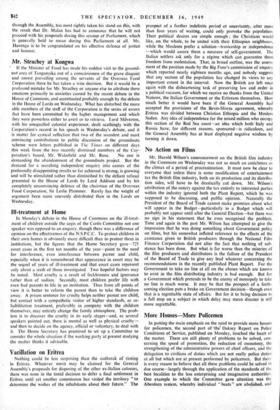Ill-treatment at Home
In Monday's debate in the House of Commons on the ill-treat- ment of children outside the aegis of the Curtis Committee not one speaker was opposed to an enquiry, though there was a difference of opinion on the effectiveness of the N.S.P.C.C. To protect children in their, own homes is obviously more difficult than to protect them in institutions, but the figures that the Home Secretary gave-721 court cases in the first ten months of the year—point to the need for interference, even interference between parent and child, especially when it is remembered that appearance in court may be the sequel of years of ill-treatment and that court cases represent only about a sixth of those investigated. Two hopeful factors may be noted. Most cruelty is a result of fecklessness and ignorance rather than of sadism. Secondly, most children prefer life with even bad parents to life in an institution. Thus from all points of view it is better to reform the parent than to take the children away. A prison sentence for cruelty helps neither parent nor child, but contact with a sympathetic visitor of higher standards, or re- habilitation treatment, preferably in company with the children themselves, may entirely change the family atmosphere. The prob- lem is to discover the cruelty in its early stages—and, as several speakers pointed out, there is mental as well as physical cruelty— and then to decide on the agency, official or voluntary, to deal with it. The Home Secretary has promised to set up a Committee to consider the whole situation if the working party at present studying the matter thinks it advisable.


































 Previous page
Previous page